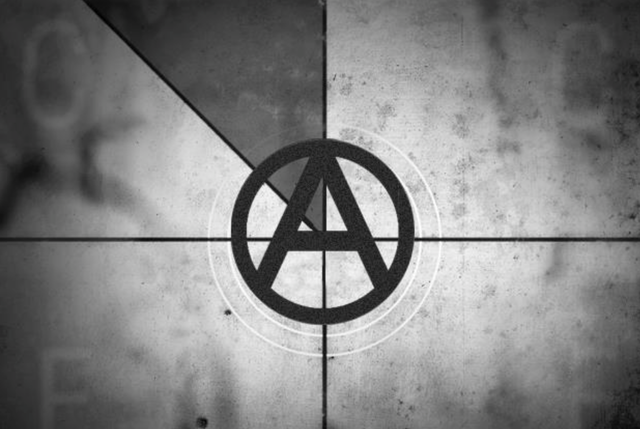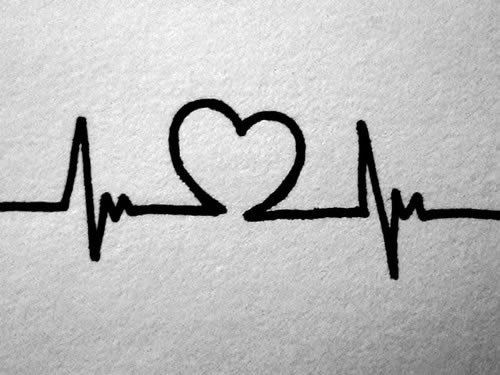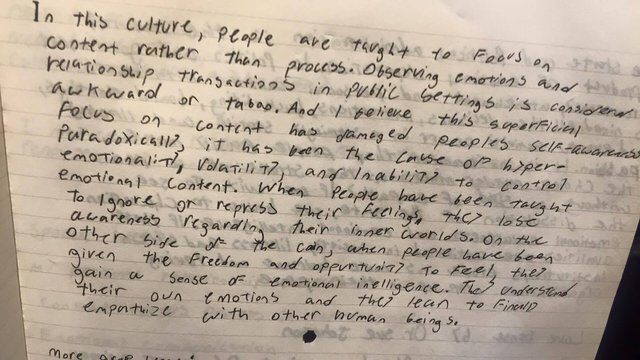The Relational Anarchist Primer

"When you show deep empathy toward others, their defensive energy goes down, and positive energy replaces it. That's when you can get more creative in solving problems."-Stephen Covey
Relational Anarchism is a standalone vector or field of thought under the umbrella of anarchism.
In this perspective, relationships determine levels of human freedom. The process of human interaction is more important than content.
The way people relate to each other is considered the process. It necessitates freedom from governments and rulers through communication efforts, rather than relying on freedom to crop up as a result of providing the better argument or information (the content)(html comment removed: more)Ways of relating—using communication processes—include narrative conversation, nonviolent communication, compassion, empathy, gentle confrontation, appraisal of body language, and other aspects of communication between people.
How Relational Anarchists Think
According to relational anarchists, the better humans connect with each other, the more peace and understanding that will exist between them. The greater the strength of the relationships, the less likely rulers will become necessary or begin to emerge.Anarchism means "without rulers." And besides being a political assertion, this is a psychological and relational preference. It is apolitical, based on preferred relationship standards. Instead of dispensing violence, these anarchists dispense compassion.
The definition "Without rulers" is a state of human interaction. It is how most people prefer to make contact with people, and how human connection unfolds when certain skill sets and forms of communication are employed. Most people do not want to be ruled. Yet they oftentimes end up in a ruler-serf dynamic as a result of cultural modes of interaction and attachment, which are generally anti-empathetic and detached.
The Content of Anarcho-Politics
Forms of political anarchism, namely anarcho-communism and anarcho-capitalism, tend to focus on the content of change rather than processes and interactions (in the very least, on the surface, processes are not emphasized compared to economic or moral considerations).These modes of thought suggest society should be arranged in regard to an economic precedent or standard. Their defenders say pure logic, argumentation, historical analysis, class analysis, moral positions, or other rhetorical tools are what will bring people over to anarchism. They also point to practical strategies like countereconomics, cryptography, protest, peaceful resistance, violent resistance, riots, and other means to bring about the Stateless society.
The Relational Solution; The Ongoing Battle of 'Left' Versus 'Right'
Relational anarchists take a more novel approach.They say anarchism will emerge within the context of human connections and the presence of empathy within relationships. It is through the conduit of connection that differences of economic opinion can be dismantled and the mutual struggle for property ownership versus non-property ownership can be worked out through connection, bonding, and the process of communication.
The hope is that all competing parties can figure out how to maintain their economic preferences and lifestyles without wanting to force their views on others, because the truth is that any party is not going to be able to change the mind of all their detractors.
So in lieu of an infinite struggle of deciding on the best economic idea for society, the relational anarchist asks everyone to come to the table and figure out how to cooperatively coexist in a State of anarchy. Indeed, the partial reason governments have maintained their power is because of the ongoing battle between "left" and "right."
As an aside, relational anarchists do not necessarily oppose or support defensive violence. The use of defensive violence will differ from person to person and depend largely on their preferences and principles. Personally, I believe that if a person initiates violence, they have sacrificed any opportunity for compassionate connection, and the most loving thing a person can do is defend themselves from that act of violent hatred.
Relational Anarchism in Practice
It is true relational anarchism contains a lot of theory and speculation. The evidence that this could work stems from counseling psychology and attachment theory.
In counseling psychology, evidenced-based practice suggests people are more likely to heal not as a result of some strategy or rhetorical intervention the counselor uses, but because of the bond developed by counselor and client.
Laurie Meyers, writing for Counseling Today, confirmed the importance of the therapeutic alliance or "counseling relationship":
In 2001, a comprehensive research summary published in the journal Psychotherapy found that a strong therapeutic alliance was more closely correlated with positive client outcomes than any specific treatment interventions.In this regard, I believe anarchists can improve their outcomes for persuasion and getting people involved in anarchism if they focus on social therapy, connection processes, and their relationship with society-at-large.As a last bit of working evidence, attachment theory has taught us that humans thrive when their bonds with other humans are strong. Not only do they thrive, but they learn how to connect with others and work through problems.
In relationship settings with adults, securely attached adults seem to have more satisfactory and less hostile relationships. In terms of society, if this theory is applied on a grand scale, it could determine how quickly society moves toward relational anarchism.
However, there needs to be research conducted in all these areas. Perhaps it will start a new research trend with a goal to understand how "social healing" can take place via different communities and movements.
A Plurality of Strategies; Psychologically-Minded
As a final thought, relational anarchists understand the need for a plurality of strategies and thought process to bring about freedom and social healing, but they also believe that without proper communication, differences in economic or political theory cannot be resolved in practice. Communication—or the processes of interaction—must be completely open and unblocked for positive change to occur.It is difficult to work things out for peace, social cohesion, and spontaneous order when humans have not opened up to the idea of being psychologically-minded, or focusing on processes. Without this prerequisite for building anarchism, the political gainsaying, economic overtures, practical advice, and pleas for freedom will be lost on deaf ears of an non-empathetic and uncaring audience.
"In this culture, people are taught to focus on content rather than process. Observing emotions and relationship transactions in public settings is considered awkward and taboo. And I believe the superficial focus on content has damaged people's self-awareness. Paradoxically, it has been the cause of hyper-emotionality, volatility, and an inability to control emotional content. When people have been taught to ignore or repress their feelings, they lose awareness of their inner worlds. On the other side of the token, when people have been given freedom and opportunity to feel, the gain a sense of emotional intelligence. They start to understand their own emotions, and they can finally relate with and empathize with other humans."---From my personal journal, early 2016




That is a very informative post, thanks for sharing, Sterlin!
Great piece. Thanks for sharing.
I sometimes wonder. There's a sense in which their lives are easier if someone's always telling them what to do. It's much simpler to have a regimen laid out for you than be responsible for your own.
I share my perspective on the state and freedom with people, often with a response that seems to cling to the comfort and stability of being told what to do. In fact, I get the impression that most people who say they want to be free really don't know what it means, ultimately.
I hope I'm wrong, but I have my doubts.
People can voluntarily yield to some leader they trust.
Absolutely!
And perhaps that's the answer that many who seem to want to be ruled but voice a desire for freedom. It really seems like the majority will flock under a banner, given a choice, though.
I really put in the effort to focus in on your words. Thank you for one more opportunity to turn down my mind chatter and experience joy and connection at a deeper level.. I'm really looking forward to Anarchapulco.
Same here brother. Can't wait to meet you.
Interesting and novel approach. I admit to being sceptical when I started reading. Psychology is a rather dodgy field often highly speculative, abstract, generalising, and with petty evidence. Anarchist theory is often too idealistic, contradicted by my experience (even though I psychologically am an anarchist with a big need for peace and tolerance (leben und leben lassen)). Finally I kind of connected this with the aesthetic theory of Nicolas Bourriaud (relational aesthetics) of which I am rather critical, mainly because it tried to describe a common phenomenon, but really never got to the point and ended up just relying on the institution (the state).
But after reading this I am much more positive. Your thoughts surely are specualtive (as most anarchist theory :) but it do resonate with me empirically. What is called therapeutic alliance for example, might just be the fact that communication with a person you trust and whose wisdom (maybe a bad word - the best I could come up with) you acknowledge actually (sometimes) can bring a person beyond the determinism of it's own personality (psychologically or sociologically determined.)
I live in Denmark, together with the Netherlands one of the first places the new populism arose, and I have been through all the same reflections that fill the columns of newpapers, blogs etc. after the brexit and the Trump election. Aggression, sorrow, misanthropy you name it. But after more than 15 years of this I have simply come to the point where I only hope for a mending, a peace-effort, what you call social healing (as I understand you). You can not exclude 1/5 of the population (generally poor white) because the try to exclude 1/20 (generally poor Muslims). The problem is not a Danish one it could be applied to anywhere. Divide and conquer tactics is seen in India, in the US, basically everywhere and it work just as good now as it ever did.
So I really liked this simply because it resonates with my practical views of how things has to be done. Confrontation has to be peaceful, to have justice you have to have empathy etc. It is actually just common sense.